In this segment we will consider the movies:
Constantine and
Seven Pounds
I wanted to make a few comments about certain movies and television shows that somehow touch upon theology and particularly the Judeo-Christian worldview. True Freethinker has previously considered The Da Vinci Code, Angels and Demons and The Last Templar; find these at this link.
I suppose that the first thing to do is to state: SPOILER ALERT!
One thing that I often puzzle over is why so many movies and TV shows go in between reality and fantasy when it comes to theology; particularly Judeo-Christian theology. They could created an entirely fictional world and invent brand new theology or they could play off of accurate depictions of Judeo-Christian theology. Yet, for some reason many movies and TV shows create a fantasy world where in functions an odd and twisted or watered down Judeo-Christian theology. It is certainly difficult to discern whether this is due to ignorance of traditional/biblical/orthodox Judeo-Christian theology or whether Judeo-Christian theology is merely viewed as just another line of fiction to be pragmatically manipulated towards the story’s end.
The concern is that there are many people who do, in fact, get theology from the media: the news, movies, books, magazines, TV shows, etc. Thus, accurate representations are very important. I recall a young man who was some sort of agnostic and loved to argue with me about Judeo-Christian theology. He made reference to how angels came about, not as his opinion but expressing what he thought to be Judeo-Christian theology. He stated that when “good” people die they become angels and could barely believe it when I told him that Judeo-Christian theology teaches no such thing and never has. Angels are an entirely separate category of being. I certainly do not know whence he got such ideas; if from media or elsewhere.
In any regard, it appears unlikely that Hollywood and other media outlets will seek to ascertain accurate Judeo-Christian theology any time soon, or ever, and so the best course of action is to be aware and discerning.
While every bit of fiction could be examined theologically let us focus briefly on two movies and two TV shows. I will not provide an everything that you ever wanted to know account but merely mention a few points of interest.
Constantine
This is not a movie that you want to watch unless you are into horror movies as it deals with death, demons, the occult and is generally creepy.
Constantine is based on the comic book “Hellblazer,” not to be confused with Clive Barker’s “Hellraiser.”
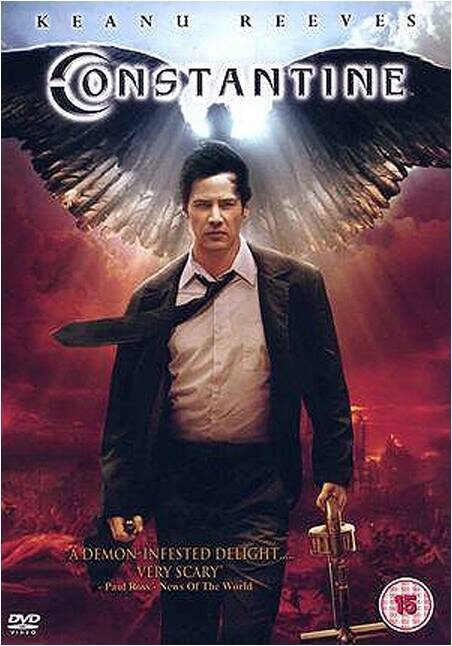
The main character is John Constantine who is played by Keanu Reeves. He was born with the ability to see half breeds. We are instantly in the realm of discernment as within the story God and lucifer made a wager to see who could gain the most souls. The rules of the wager are that no direct contact was allowed but only influence.
Basically angels and demons are not supposed to act directly either but there are half breeds who are part angel and part human or part demon and part human who do attempt to influence one way or the other; the influence peddlers. All of this is, of course, most foreign to Judeo-Christian theology.
Half breeds outwardly look like humans but John Constantine could see the demonic ones for the creepy things that they were. Another bit of contra Judeo-Christian theology imagery which is ubiquitous in fiction of all sorts, even Christian artwork, is that lucifer and his angels, the demons, are creepy monster looking things; there is no indication of this in the Bible.
Due to his ability to see them Constantine is made to undergo shock therapy by his parents while still a child (early teens?). The result of which is that he commits suicide and goes to hell. Why hell? Simply, as far as I can tell from the movie, because the movie plays off of Roman Catholic theology in particular which declares that suicide is a damnable sin. That suicide is, sort to speak, the unpardonable sin and instantly gains one hell is not biblical nor a normative, traditional, orthodox Judeo-Christian view.
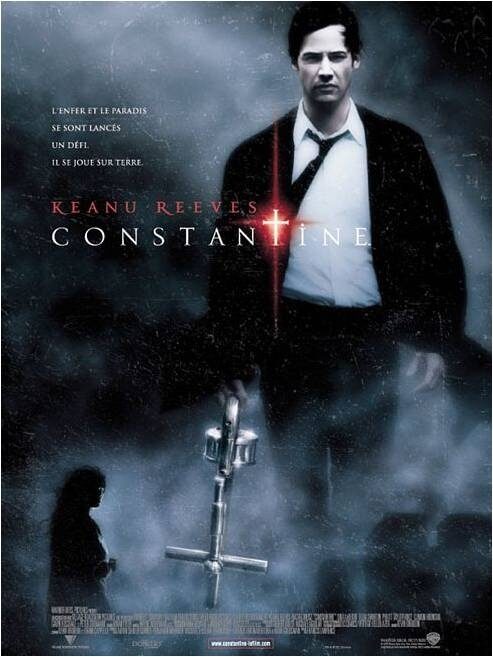
John Constantine is medically revived after his suicide and so lives on but knowing that ultimately his death will lead to hell. Within the movie there is some confusion on this point as concepts of salvation are discussed.
Thus, Constantine determines to spend his life “deporting” demons/half breeds back to hell. I state “demons/half breeds” because it was sometimes difficult to discern which was being referred to and also because with the story demons were crossing over into our world where they were not supposed to be in order to bring about a styled apocalypse. Constantine does this in order to, again playing off of Roman Catholic theology’s tendency towards works based salvation, gain the favor of God by his good deeds and thus buy his way into heaven. During one of his meeting with the angel Gabriel he is dissuaded from this view and told a basically kosher gospel of grace; sans any mention of Jesus however.
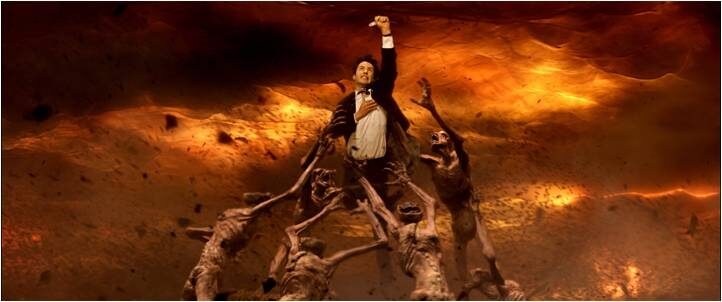
One interesting aspect of the movie is that it begins with the finding of the “Spear of Destiny” (aka the “Spear of Longinus”) wrapped in a Nazi flag which, although not pursued in the movie, hints at Nazism’s tendency towards the occult. I have listed various influences upon Nazism including Buddhism, Hinduism and atheism at this link. The Spear of Destiny is supposed to be the spear that was thrust into Jesus as He hung on the cross. It is supposed that people such as Adolf Hilter sought it due to its supposed supernatural powers.
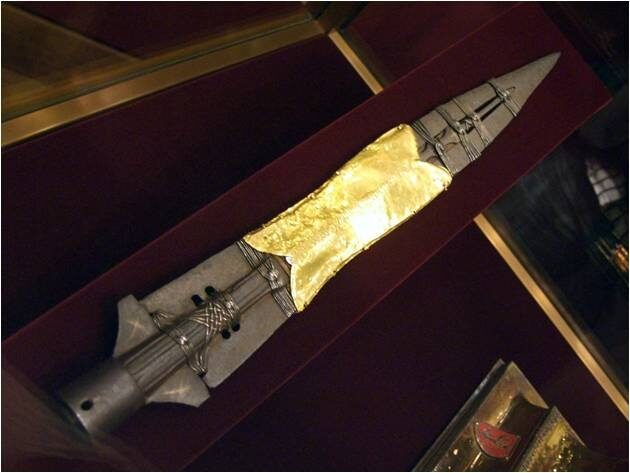
There is a bit of dialogue that more than any other prompted me to mention Constantine. Within the story the Spear of Destiny is sought because it has the blood of Jesus on it and thus, plays a part in the movies conception of the apocalypse.
Constantine states,
Jesus didn’t die from being nailed to a cross. He was killed by a soldier’s spear.
And “Angela Dodson” the co-main character of the movie, responds,
I’m a Catholic, John. I know the Crucifixion story. That is not what happened.
Actually, that is what she should have stated. What she actually stated is,
The Spear of Destiny. I’m a Catholic, John. I know the Crucifixion story.
Let us dissect this as it presents a half truth and a full falsehood,
Jesus didn’t die from being nailed to a cross.
Well, Jesus did not die at the instant that He was nailed. Yet, it was the nailing to the cross that brought about His death: the bleeding and the subsequent asphyxiation that occurred due to His progressing inability to pull Himself up to allow His chest cavity to expand enough gain breath.
He was killed by a soldier’s spear.
Simply false.
A Catholic knows this as well as anyone who merely opens a Bible and reads it. Jesus breathed His last upon the cross and when it was time to take the bodies down the legs of the two at His sides were broken. This was because they were still alive and broken legs would not allow them to pull themselves up for a breath anymore. However, Jesus’ legs were not broken since He was already dead and His side has pierced basically as proof.
So when Jesus had received the sour wine, He said, “It is finished!” And bowing His head, He gave up His spirit…
Then the soldiers came and broke the legs of the first and of the other who was crucified with Him.
But when they came to Jesus and saw that He was already dead, they did not break His legs.
But one of the soldiers pierced His side with a spear, and immediately blood and water came out. (John 19:30, 32-34).
That blood and water came out denotes that His bodily fluids were already breaking down.
This is my concern: why appeal to Judeo-Christian theology or even make specific reference to Roman Catholic theology only to turn around and present a false picture of it? Why not invent a fantasy world with fantasy theology or else appeal to Judeo-Christian theology and depict it accurately. Besides, the point of the dialogue was to establish Jesus’ blood upon the spear and so how He died had nothing to do with it because His blood is on it even though the spear thrust did not kill Him.
Yet, I am not so much asking why but urging discernment since the answer as to why, as mentioned above, is likely multifaceted.
I made reference above to the possibility that Judeo-Christian theology was merely viewed as just another line of fiction to be pragmatically manipulated towards the story’s end. This is certainly a point made by Keanu Reeves who stated,
I think of it as just secular religiosity…
I was hoping that these concepts could become a platform that are humanistic…
it’s very humanistic…
Incidentally, it was not until the very end of the movie that I recalled that I had actually read the comic upon which it was based long before at a friend’s house. I recall that in the comic book lucifer was depicted as a beautiful angel in a white gown and curly blond hair. This is probably more accurate than depicting some sort of monster. I do not know about skin and hair color, especially considering that angels, even fallen ones, do not have bodies as we know bodies to be. But I think that it is more accurate in that it denotes the appeal of lucifer, the Bella Lugosi as Count Dracula appeal of the attractive, slick, even stylish and hip surface that hides the monster within.

In the movie, lucifer appears in a white suit, with short black hair, no eyebrows and tattoos.

Another interesting difference between the comic and the movie is that Constantine is dying of cancer since he chain smokes. In the end, he again commits suicide in order to get lucifer to come and claim his soul. When lucifer does so, Constantine makes a deal to have him release the soul of Angela Dodson’s sister from hell in exchange for his. The sister was in hell due to having committed suicide as well. For some odd reason lucifer agrees; I say odd because they were both his anyhow. Yet, the agreement brings with it heaven’s favor as Constantine willingly sacrificed his life for hers; or his soul for hers.
Now, this is actually not in keeping with the grace that Gabriel had preached within the movie and basically plays upon the works based salvation fallacy. Incidentally, Gabriel is represented as a pretty odd character who end up assisting the bringing about of the apocalypse by helping lucifer’s son, another non-Judeo-Christian theology element, in order to circuitously help God—or something.
In any regard, lucifer is no longer able to take Constantine as he has been saved and so he supernaturally plunges his hands into Constantine and pulls out his cancerous lungs stating that Constantine will live and will do so in order to demonstrate that he truly belongs in hell. Thus, Constantine receives brand new healthy lungs and lives on. In the comic book the very end shows Constantine going right back to chain smoking, what else to do with healthy lungs?!?! Yet, perhaps in a politically correct mover, in the movie he is seen reaching into his suit as if to get his cigarettes and yet, comes out with a pack of gum.
Constantine plays upon a theme that is ubiquitous in such fact/fiction concoctions which is that, in a matter of speaking, the occult is fought by using the occult. For example, Constantine takes a little fact finding trip into hell by placing his feet into water and staring into the eyes of a cat, etc.
A lot more could be stated and yet, the main point being that even whilst enjoying fiction we can exercise discernment and compare truth from falsehood.
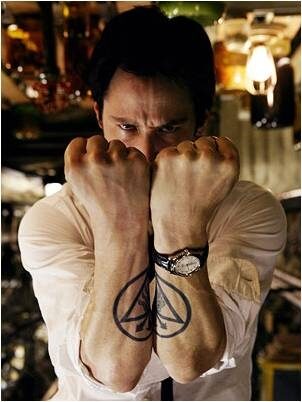
Seven Pounds
Will Smith stars in “Seven Pounds” a movie which begins by stating “In seven days, God created the world.” Perhaps Hollywood could hire Sunday School children to advise them on matters of Judeo-Christian theology. The Bible states that God created the world in six days and “rested” on the seventh.
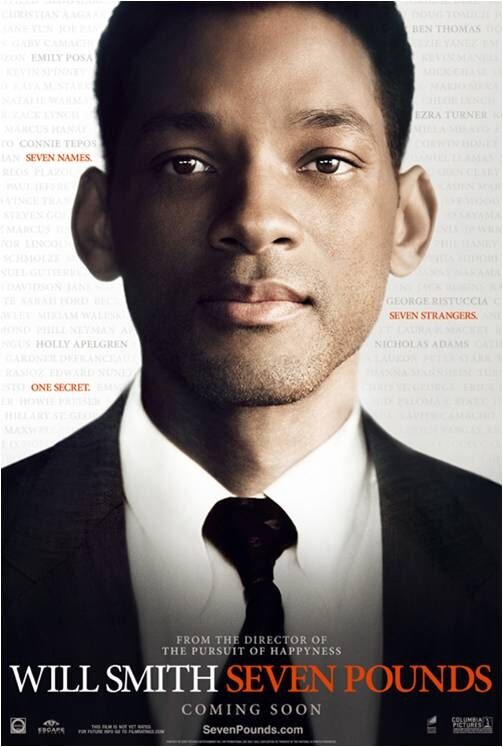
I actually do not have much to write about this movie except to note that from the get go we know that we are dealing with faulty theology. The movies is interesting, mysterious, and bitter sweet—much more bitter than sweet.
The premise is that Will Smith’s character, Tim Thomas, caused a car crash in which seven people died. He thus determined to reach out to seven strangers and help them by doing things such as donating his organs, bequeathing a home to an abused woman, etc.
His ultimate goal is to commit suicide which he does by placing a deadly jellyfish into his bathtub.
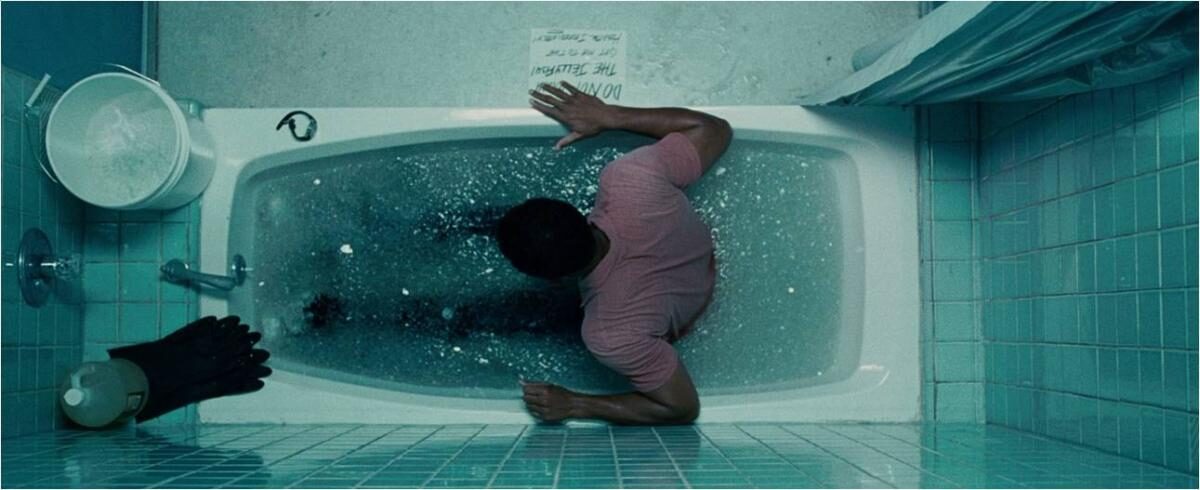
Theology is not directly appealed to in Seven Pounds and thus, we do not know about the movie’s view on heaven and hell. Interestingly, good deeds and suicide play a role in both Seven Pounds and Constantine. Moreover, Tim Thomas’ self-appointed redemption includes fornication so; who knows what’s what in the world of this movie.
Nothing more is made of the statement that “In seven days, God created the world” and so I wonder whether if accurate theology has been employed the movie would have begun by stating “In six days, God created the world” and the movie would have had six car crash victims and been called “Six Pounds”? Who knows?
When the movie “Seven Pounds” was released in Europe it was called “3.17514659 Kilograms.”

Just kidding :o)
~~~~~~~~~~~~~~~~~~~~~~~~~
Products: Constantine:
Seven Pound:
